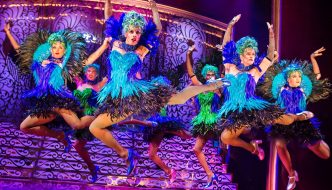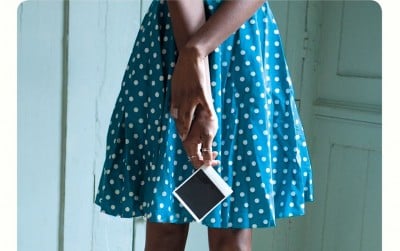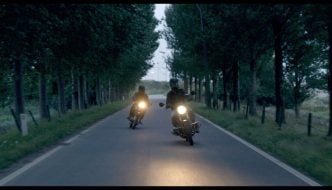Interview: Joe Geddes, Director and Cast of “Futureproof”
September 15, 2015
[Image courtesy of Leeds Art Theatre]
So what do the World’s Fattest Man, a pair of conjoined twins, a mermaid, a bearded lady with no arms and someone who identifies as both a man and a woman have in common?
Absolutely nothing.
Before curtains go up on Wednesday, we grabbed a few words from director Joe Geddes about the experience of bringing the script from page to stage. Additionally, the cast consisting of Bethany Givvons-Collinge, Abbie Thorpe, Melissa Brayshaw, Megan Burton, Kris Macjames and Rachael Elder weigh in on how they’ve tapped into their inner “odd” in a play which brings the unlikeliest of entities together.
TSOTA: What was it about this particular play which stood out to you from a directing perspective?
JG: For a few years this has been a favourite play of mine to read, and after the success of my last play ‘Eight’, which was very simplistic, I wanted to take on a challenge. And this play has most definitely been a challenge
TSOTA: At first glance the play seems to focus on the crisis of identity, would you say that’s a theme which runs all the way through the story?
JG: Crisis of identity is a theme that runs through the script, but that isn’t the only theme. Others include how it’s important to be your own person, to appreciate what you have, the importance of family and how success can be dangerous.
TSOTA: Even though the setting is very unique, do you think the play resonates with societal issues today?
JG: Absolutely, there is still a large amount of prejudice in society and this play ultimately is about self-acceptance, and acceptance of others.
TSOTA: Hello cast! So, to start, what were your first impressions of the script after reading it?
MBurton: My first impression of the script was ‘how the bloody hell are we going to pull this off?’ Siamese twins? World’s Fattest man? A technical nightmare!
KM: First impressions were that it wasn’t going to be a, dare I say it: “normal” play. There’s no question that everyone has had to dramatically adapt to the characters as they are deliberately created to be out of the ordinary.

[Photo credited to Joe Geddes]
BGC: Give me a travelling show or a circus and I’m automatically on board! Haha, no. What struck me about the play was how bittersweet the ending was. Acceptance, but at what cost?
TSOTA: Were there any characters you immediately clicked with, ones you thought “Yes, I could nail this!”?
AT: The mermaid of course! Why wouldn’t anyone not want to play a mermaid? But the fact she didn’t speak intrigued me the most of all the characters.
RE: Marketa was the one that stood out to me most, just because she was the type of character I usually get cast as, being slightly spiky and tough but with a lot of depth, and I found her story so sad and so interesting, she was instantly the one I loved most.
KM: I loved the character of Riley who I ended up playing. Nothing thrills me more as an actor than taking a character and finding the opposites. Like a murderer’s soft side, or a family man’s inner demons. Riley stood out to me because the show, when it comes to him, is entirely about this process.
TSOTA: How did you prepare for your roles?
MB: Learning how to move with another person helped preparation. I also made script annotations, recorded myself signing to get the hang of it and also researched the separation of conjoined twins.
AT: I’ve had to work a lot on facial expressions with Serena, as everything I feel has to be portrayed through my body.
BGC: I did a lot of research. Victorian Odditoriums, blogs written by intersex people which helps as I like writing back stories for characters. Also I spent a lot of time thinking of what George/Georgina’s life had been like before she found Riley.
RE: I worked incredibly hard on the accent, because I wanted her to have a unique sound. The accent had to be both believable and understandable, but with a dramatic flair that would suit her personality. Other than that, practicing not using my arms when speaking was a large part as I couldn’t rely on the limbs I wouldn’t have on stage to convey the emotions I needed to.
MBurton: Well as a pair, we’d practice walking together, sitting, standing and also trying to tap into each other’s habits of movement as though we’d spent all our lives together and had the exact same habits.

[Photo credited to Joe Geddes]
KM: Initially I looked at his motives, his need to behave the way he does plays a huge part in the development of him. Other key aspects were his desperation to succeed along with his vulnerability.
TSOTA: What were the biggest challenges when it came to the rehearsal process?
RE: The most difficult part of the rehearsal process was definitely the travelling! Living so far away meant my time working with the others was limited and while they were building the cast relationship that would shine through in the performance, I struggled to feel as connected because I was so far from the action.
BGC: My biggest challenge was coming to terms with how fundamentally nice George/Georgina was. I don’t tend to play nice characters, and G doesn’t really have a nasty bone in their body. It was a challenge, but it was a refreshing change!
AT: I’m awful when it comes to eye contact, like full on staring another character out and that’s exactly what I have to do most of the time! So it’s been fun training myself not to break character.
MB: The sign language definitely, it’s learning a whole new language and that was difficult. Also because it’s quite a big cast, the group scenes were difficult to remember in terms of when my next line was!
TSOTA: And lastly, in your own words, can you sum up the overall message of the play?
MB: If it’s not broken, don’t attempt to fix it and believe in who you are and accept your differences, that’s what makes you unique.
RE: Individuality is everything, following the crowd can be dangerous and family, however disjointed, is precious.
BGC: Everyone is different and it’s something to be celebrated. If you want to change, then by all means change. But make sure you’re doing it for you and not because someone else wants you to. No matter what colour your skin is, the gender you identify as (should you chose to identify as one at all), your age, your disability or your sexuality; you deserve acceptance.
AT: Your voice is important whether it’s spoken or signed. MERMAIDS FOR LIFE.
Robert Riley’s Odditorium rolls into town Wednesday September 16th and runs until the 19th.
Raisa Butt
Don’t miss “Futureproof”, presented by Leeds Art Theatre, Upstairs @ The Carriageworks
Tickets: £10.50 (£8.50 concession)
Filed under: Theatre & Dance
Tagged with: Carriageworks theatre, Futureproof, interview, Leeds Art Theatre, theatre



Comments